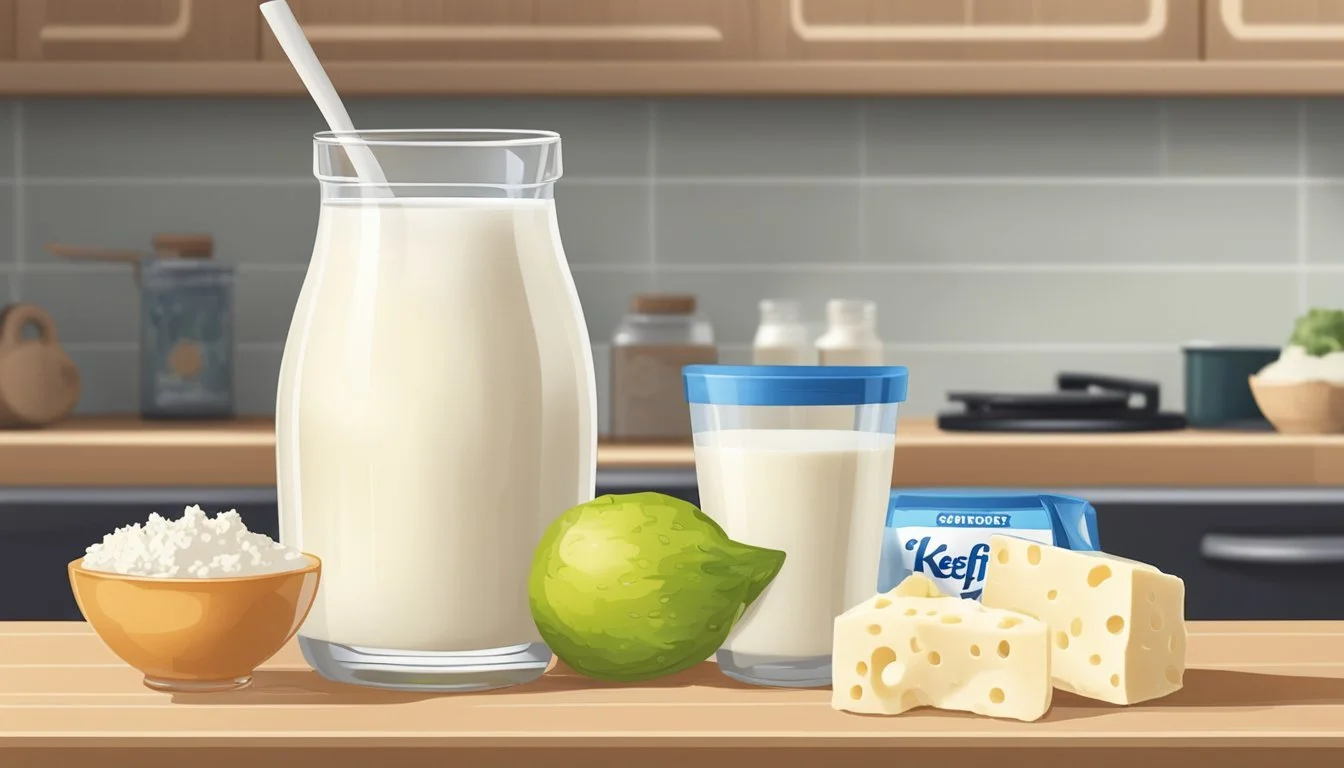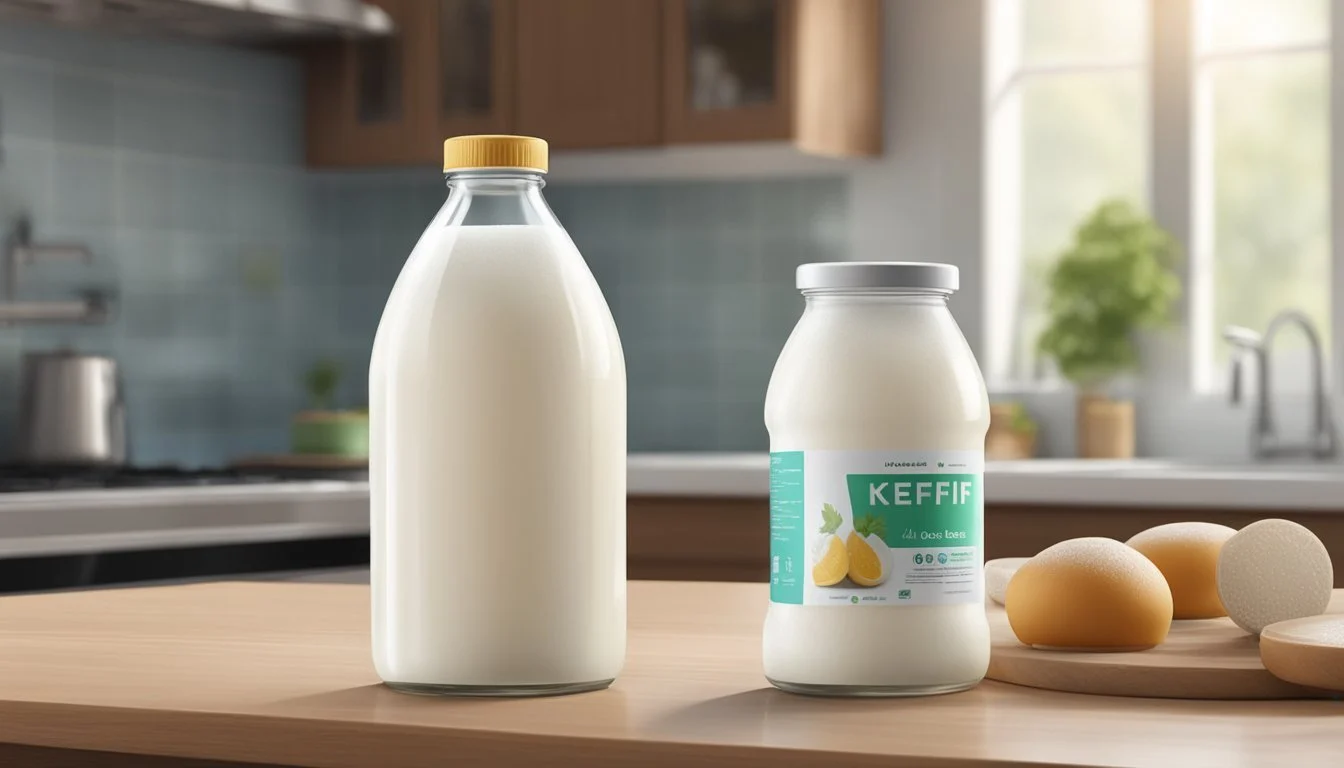Does Kefir Go Bad?
Understanding Shelf Life and Storage Tips
Kefir is a fermented, probiotic beverage that many people enjoy for its health benefits and tangy flavor. Made by fermenting milk with kefir grains, this drink is packed with beneficial bacteria and yeast. But like any dairy product, the question arises: does kefir go bad?
Yes, kefir can go bad, and its shelf life varies depending on storage conditions and whether it's pasteurized. When kept in the refrigerator, opened pasteurized kefir can last up to two weeks, while unpasteurized kefir tends to spoil within 5-7 days. Signs of spoilage include an overly sour taste and off smell, signaling that it's time to discard it.
Proper storage is crucial for extending kefir's shelf life. Storing kefir in the coldest part of the fridge and keeping the container tightly sealed can help maintain its flavor and probiotic benefits for as long as possible. Regular users of kefir will find this knowledge invaluable for enjoying their probiotic drink at its best.
What Is Kefir?
Kefir is a fermented dairy product known for its rich probiotic content. It has roots in Eastern Europe and provides numerous health benefits due to the live bacteria and yeast cultures it contains.
Understanding Kefir and Its Origins
Kefir originates from Eastern Europe, particularly Russia and the Caucasus region. The name "kefir" is derived from the Turkish word "keif," meaning "good feeling." Historically, kefir was made using goat, cow, or sheep milk, which was fermented in leather bags.
The fermentation process involves adding kefir grains, which are a symbiotic culture of bacteria and yeast (SCOBY). These grains resemble small cauliflower florets and contain a complex mixture of lactic acid bacteria, acetic acid bacteria, and yeast.
Fermented milk beverages like kefir have been consumed for centuries due to their supposed health benefits. The probiotics present in kefir are beneficial for gut health and may enhance digestion and improve immunity.
The Science Behind Fermented Milk Drinks
The fermentation of milk to create kefir is a complex biochemical process. Kefir grains are added to milk, where they begin to ferment the lactose, the sugar found in milk. This process converts lactose into lactic acid, giving kefir its characteristic tangy taste.
The microbial activity in kefir grains involves both lactic acid bacteria (such as Lactobacillus species) and yeast (such as Saccharomyces and Torulaspora). These microorganisms work together to produce a wide array of nutrients such as vitamins B1, B2, C, and K, as well as folic acid.
This fermentation process not only enhances the flavor and texture of the milk but also increases its shelf life. The probiotics produced during fermentation can have various health benefits, including improved digestion, enhanced immune function, and potential anti-inflammatory effects.
Nutritional Profile of Kefir
Kefir is known for its diverse nutritional offerings, which include essential vitamins, minerals, and probiotics that contribute to various health benefits.
Vitamins and Minerals
Kefir provides a significant amount of calcium, approximately 300 milligrams per 8-ounce serving, delivering about 30% of the daily value (DV). Adequate calcium intake is necessary for maintaining strong bones and teeth.
Additionally, kefir contains vitamin A (6% DV) and sodium (4% DV). Phosphorus, crucial for bone and teeth formation, offers 20% of the DV per serving. The beverage also supplies essential B vitamins like vitamin B12 (29% DV) and riboflavin (B2) (25% DV), supporting energy metabolism.
Probiotic Composition
Kefir is rich in probiotics, including Lactobacillus kefir and Saccharomyces kefir, which support gut health. These beneficial bacteria and yeast strains help maintain a balanced microbiome, enhancing digestion and combating harmful microorganisms.
Consuming probiotics through kefir can alleviate digestive issues such as lactose intolerance and irritable bowel syndrome (IBS). Additionally, probiotics play a role in immune system modulation, potentially reducing the risk of infections and inflammation-related conditions.
Overall, kefir's probiotic content adds to its reputation as a functional food, providing both nutritional and therapeutic benefits.
Health Benefits of Kefir
Kefir offers numerous health benefits, focusing primarily on digestive health and immune support. Each aspect touches on how kefir can positively impact various bodily functions and prevent health issues.
Digestive Health and Gut Flora
Kefir contains a high quantity of probiotics, beneficial bacteria that aid in digestion and improve gut health. When consumed, these probiotics help balance the gut microbiome, which is essential for digestive efficiency.
The fermentation process used to make kefir results in the development of numerous strains of gut-friendly bacteria, such as Lactobacillus and Bifidobacterium. These bacteria help break down food, reducing common digestive issues like bloating and gas.
Moreover, kefir’s probiotic content can assist in the treatment and prevention of gastrointestinal infections. It creates an inhospitable environment for harmful bacteria and pathogens, making the digestive tract more robust. The drink is also known to help regulate bowel movements and manage conditions like irritable bowel syndrome (IBS).
Immune Support and Disease Prevention
The probiotics in kefir not only support gut health but also play a significant role in fortifying the immune system. A healthy gut is crucial for a well-functioning immune response as it helps control the immune cells that interact with bad bacteria and viruses.
Kefir is also rich in several nutrients like vitamin B12, calcium, and magnesium, which contribute to overall wellbeing and immune health. Regular consumption of kefir can lower cholesterol levels and manage blood sugar, reducing the risks of chronic diseases such as heart disease and diabetes.
Additionally, kefir has shown potential in fighting off common infections. The strains of beneficial bacteria found in kefir can inhibit the growth of harmful microorganisms, making the body more resistant to illnesses.
In essence, kefir is a potent addition to a daily diet for those looking to improve both digestive health and immune support.
Shelf Life and Storage
Kefir, like many dairy products, has a limited shelf life. Proper storage techniques and understanding signs of spoilage are crucial to maximize its freshness.
Proper Storage Techniques
Proper storage can significantly extend the freshness of kefir. Store-bought kefir typically lasts for 1-2 weeks when unopened and should be kept in the refrigerator at temperatures between 40°F and 50°F. Once opened, it should be consumed within two weeks or by the printed expiration date.
Homemade kefir can remain fresh for 2-4 weeks when stored in the refrigerator. Using an airtight container is essential to prevent contamination and spoilage. Additionally, minimizing exposure to oxygen helps slow down the growth of harmful bacteria. Make sure to use clean utensils to avoid introducing contaminants.
Signs of Kefir Spoilage
Identifying spoilage in kefir is essential to ensure it is safe for consumption. Visual cues include changes in color or the presence of mold. Unpleasant odors, such as a sour or off-smell stronger than usual, can also indicate spoilage.
Texture changes can also be a sign; kefir that has separated into curds and whey may have gone bad. Finally, an off-taste—more sour than usual or bitter—should prompt you to discard the kefir. Regularly checking these signs can help maintain safe consumption and prevent potential health risks.
Can Kefir Go Bad?
Kefir, like other dairy products, does have a limited shelf-life. It can spoil if not stored properly or consumed within a certain timeframe.
Factors Affecting Kefir Spoilage
Temperature: Proper refrigeration is essential. Kefir should be kept at or below 40°F (4°C). Warmer temperatures accelerate the growth of harmful bacteria and molds.
Contamination: Using dirty utensils or hands when handling kefir can introduce contaminants. Even a slight exposure to bacteria or other microorganisms can spoil kefir.
Exposure to Oxygen: Once opened, kefir gets exposed to oxygen. This can speed up its spoilage by promoting mold growth and bacterial contamination.
Pasteurization: Pasteurized kefir generally lasts longer than unpasteurized kefir. Pasteurization kills most of the harmful bacteria, extending the shelf-life.
Identifying Spoiled Kefir
Smell: Fresh kefir has a tangy smell. If it emits a strong, sour, or unpleasant odor, it is likely spoiled.
Taste: Spoiled kefir tastes more sour than usual. Tasting a small amount can quickly indicate spoilage.
Appearance: Visible mold growth, changes in texture, and separation are common signs of spoiled kefir. Any unusual changes in color or consistency also indicate spoilage.
Shelf-life: Typically, opened kefir lasts about 1-2 weeks when refrigerated. Unopened, it can last until its expiration date and sometimes longer if stored correctly.
Spoiled kefir can cause foodborne illnesses. Always exercise caution and check for these spoilage signs before consuming.
Storing Kefir for Extended Freshness
Proper storage methods can significantly extend kefir's shelf life, ensuring that it retains its freshness, nutritional value, and probiotic benefits. The best ways to store kefir are by using refrigeration and occasionally freezing.
Refrigeration vs. Room Temperature
For most types of kefir, storing it in the refrigerator is the optimal method. Kefir should always be kept in air-tight containers to prevent exposure to oxygen, which can accelerate spoilage. Homemade kefir, like store-bought, should be refrigerated immediately after fermentation.
Keeping kefir at room temperature can lead to rapid spoilage and the growth of harmful bacteria. This is particularly true for kefir left in contaminated environments or exposed to unclean utensils. Therefore, refrigeration can extend its freshness up to two weeks or a little beyond, depending on the product.
Freezing Kefir
Another method to extend kefir's shelf life is by freezing. Freezing kefir is beneficial for those who don't consume it quickly. To freeze kefir, place it in air-tight containers or ziplock bags, leaving some space for expansion. Frozen kefir can remain good for up to three months without significant loss in quality.
When ready to use, thaw kefir in the refrigerator overnight. Although the texture might change slightly, the probiotic benefits and nutritional value remain largely intact. Remember, repeated freezing and thawing should be avoided to maintain the best quality.
Preparing and Using Kefir
Kefir is versatile, whether made at home or incorporated into various recipes. Here’s how to prepare and use it effectively.
Homemade Kefir Techniques
Homemade kefir can be made using milk from cows, goats, or other animals. Begin by adding kefir grains to a jar of milk. Cover the jar with a breathable cloth or paper towel, secured with a rubber band, to allow fermentation.
Let it sit at room temperature for 24-48 hours. The fermentation process causes the milk to thicken and develop the tangy kefir flavor. Once fermented to your liking, strain out the kefir grains using a non-metal strainer.
Store the grains in fresh milk in the refrigerator for later use or start a new batch immediately. Properly made kefir should have a slightly sour taste and smooth texture. If it smells off or overly pungent, it may be spoiled.
Incorporating Kefir into Recipes
Kefir can be used in many culinary applications. It's excellent as a base for smoothies—simply blend it with fruits and sweeteners for a nutritious drink.
Use kefir as a substitute for drinkable yogurt or buttermilk in recipes, enhancing the flavor and nutritional content. Pour it over cereal or granola for a tangy twist on breakfast.
Kefir also works well in salad dressing; mix it with herbs, garlic, and lemon juice for a zingy dressing. It can even be used in baked goods, where its acidity helps activate baking soda, making cakes and bread lighter and fluffier.
Experiment with these uses to make the most of kefir’s versatility in your kitchen.
Troubleshooting Common Kefir Issues
Kefir can sometimes develop problems with texture and taste or even become contaminated. Knowing how to address these issues can help you maintain the quality of your kefir batches.
Dealing with Contamination
Contamination in kefir typically results from microbial contamination. This can lead to off smells, unusual colors, or unexpected flavors such as an overly sour taste.
First, make sure your utensils and containers are clean. Use sterilized equipment to prevent introducing harmful bacteria.
Second, if you suspect contamination, discard the batch. Gently rinse your kefir grains with filtered water free of chlorine and chloramine.
Third, ensure fermentation is done in a clean environment, away from houseplants and other fermenting foods. This reduces the risk of cross-contamination.
Addressing Texture and Taste Variations
Kefir texture and taste can vary from batch to batch, often swinging from thin to thick or tangy to overly sour.
For a thicker kefir, try decreasing the amount of milk or increasing fermentation time. Cooler temperatures can also slow down fermentation, affecting texture.
If your kefir tastes too sour, shorten the fermentation time. You can also mix in fresh milk and let it sit for a shorter period.
Separation of kefir, where the liquid and solids split, often relates to over-fermentation. Stirring the kefir more frequently can help maintain a consistent texture. Keep an eye on fermentation time to minimize separation.
By following these steps, you can troubleshoot and maintain the desired quality of your kefir.
Choosing the Right Kefir
When selecting kefir, it's essential to be aware of the different varieties and understand how to read labels correctly. Choosing the right kefir ensures you get the most benefits and flavors suited to your preferences.
Differentiating Between Kefir Varieties
There are two main types of kefir: milk kefir and water kefir. Milk kefir is made from cow, goat, or sheep milk, and is a creamy fermented drink rich in probiotics and other nutrients. Water kefir, on the other hand, is dairy-free and uses water, sugar, and fruit for fermentation, making it suitable for those with lactose intolerance.
Milk kefir can come in plain, flavored, and low-fat versions. On the other hand, water kefir often includes natural flavors from fruits or herbs. Some people prefer making homemade kefir using glass jars, which is believed to maintain purity and avoid any chemical interaction.
Reading Labels and Making Informed Decisions
When purchasing kefir, carefully read the labels to ensure you're choosing a product that aligns with your health and dietary preferences. Look for phrases such as “live and active cultures,” which indicate a high probiotic count. Check for expiration dates and note that opened kefir usually lasts about two weeks.
Labels often list ingredients, and it's best to choose those without preservatives or added sugars. Assess the type of container; glass is generally preferred over plastic due to fewer chemical leach concerns. Always verify the product's storage instructions to avoid it becoming sour or moldy and compromising its quality.
Conclusion
Kefir, a fermented milk drink, is a nutritious fermented dairy product that comes with various health benefits.
Rich in lactic acid and beneficial bacteria, kefir can aid in gastrointestinal health and improve digestion.
Proper storage is essential to maintain its quality and safety. It should be kept in an airtight container in the refrigerator.
Unopened, it generally lasts 2-3 weeks.
Once opened, it should be consumed within 7-10 days. It's crucial to monitor for signs of spoilage, such as a sour smell.
For those with allergies to dairy, kefir may still be an option as fermentation reduces lactose content.
However, always consult with a healthcare provider.
Certain nutrients like vitamins, minerals, and probiotics make kefir a valuable addition to a healthy diet.
Using kefir grains ensures a continuous supply of this beneficial drink.
In summary, proper handling and storage help extend kefir's shelf life while preserving its health benefits.








